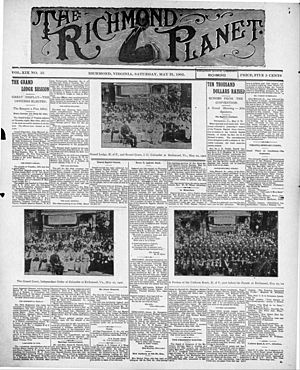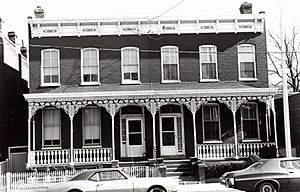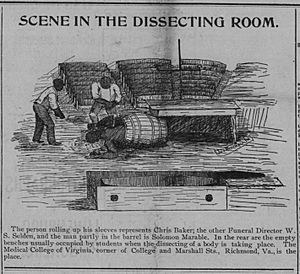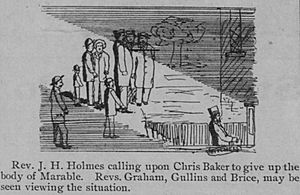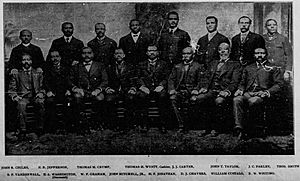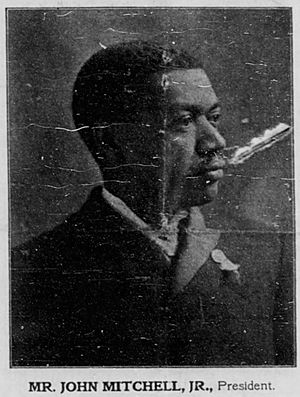John Mitchell Jr. facts for kids
Quick facts for kids
John Mitchell Jr.
|
|
|---|---|
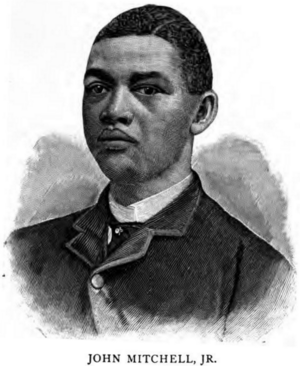 |
|
| Born | July 11, 1863 Richmond, Virginia, U.S.
|
| Died | December 3, 1929 (aged 66) Richmond, Virginia, U.S.
|
| Occupation | journalist, politician |
| Political party | Republican |
John Mitchell Jr. (born July 11, 1863 – died December 3, 1929) was an important American leader. He was a businessman, a newspaper editor, and a strong voice for civil rights for African Americans. He lived in Richmond, Virginia, especially in an area called Jackson Ward. This area became known as the "Black Wall Street of America."
Mitchell was the editor of a newspaper called the Richmond Planet. In his paper, he often wrote about the need for everyone to be treated equally. In 1904, he helped organize a protest. Black people refused to ride the city's trolley system because it was segregated. This meant black and white people had to sit in different sections.
He also started and led a bank called Mechanics Savings Bank. He was a city leader, serving as an alderman for two terms. He was also active in many community groups. In 1921, he ran for governor as a Republican, but he did not win.
Contents
John Mitchell Jr.'s Early Life
Mitchell was born into slavery in Richmond, Virginia in 1863. This was just before the American Civil War ended and slavery was abolished. His mother taught him how to read. Later, he worked as a newsboy while going to school.
He then became a carriage boy for a lawyer named James Lyons. Lyons did not want Mitchell to go to school, but Mitchell's mother insisted. Mitchell went to a school taught by Rev. A. Binga Jr. In 1876, he started at the Richmond Normal High School. The next year, he won a silver medal for being the best in his class.
In 1878, he joined the First Baptist Church. He was an active member his whole life. He even led the Virginia Baptist State Sunday School convention. In 1881, he drew a map for his classmates and teacher. This map impressed a minister named A. M. Riley, who gave him a medal. He won another medal in a public speaking contest.
His map-making skills helped him get a special training job. He worked at the Bureau of Engraving and Printing in Washington, D.C. Important people like Frederick Douglass encouraged him.
His Work as a Journalist
In 1883 and 1884, Mitchell wrote for the New York Freeman newspaper from Richmond. On December 5, 1884, when he was 21, he joined the Richmond Planet. This was a new newspaper for black people. He quickly became an editor. Under his leadership, the Planet became famous for fighting for racial equality and rights for African Americans. He also worked as a teacher in local schools.
Mitchell was very brave in his reporting. He spoke out against lynching, which was a terrible act of violence against black people. This violence increased after the Reconstruction era. Like another brave journalist, Ida B. Wells, Mitchell reported on these events.
Mitchell strongly condemned the lynching of Richard Walker in Charlotte County, Virginia. Because of his reporting, he received threats. People sent him a rope and a note, warning him not to come to the county. Mitchell replied with a famous quote from Shakespeare:
There are no terrors, Cassius, in your threats, for I am so strong in honesty that they pass by me like the idle wind, which I respect not.
Then, armed with two pistols, he traveled to the county. He walked five miles to the site of the lynching, showing he was not afraid.
Mitchell also reported on the death of a black man named Banks. A white officer named Priddy was involved. Mitchell believed the officer was responsible. He was even called to court for saying this, but the case against him was dropped. Mitchell tried to have Banks' body examined to find out what happened. He even had to escape from a building where the body was kept. The officer was never punished.
In 1896, Mitchell worked with local church leaders, including James H. Holmes. They asked for the body of Solomon Marable to be returned to his family. Marable's body had been taken after his execution. Mitchell investigated this case for the Richmond Planet. He even included drawings of the events in his newspaper.
A Leader in Business and Politics
Mitchell was a very social and active person. He became a leader in the Knights of Pythias, a black community group. He led this group for many years. He also served as president of the National Afro-American Press Association.
Mitchell started and was president of the Mechanics Savings Bank in Richmond. This bank was part of a growing trend of businesses owned by black people in the city. A photographer named James C. Farley, who also worked with Mitchell at the Planet, was on the bank's board.
In 1904, Richmond passed a new law. It made black and white people sit in separate sections on trolleys. Mitchell helped organize large meetings and a boycott of the trolley system by black people. Mitchell happily wrote in his newspaper that on the first day of the new law, only white people were arrested for not following the new rules. The trolley company lost a lot of business from black riders. Even though they lost money, they kept their Jim Crow policy of segregation. The company eventually went out of business.
Mitchell's Political Career
In 1892 and 1894, Mitchell was elected to be a city alderman for Richmond's Jackson Ward. This showed how well-connected he was in the community.
In 1921, Mitchell made a big move. He ran for governor of Virginia. He ran as a "Lily Black" Republican candidate. This was a group of all African American Republicans. Some black newspapers did not support his campaign. They thought his run would divide the black vote. They worried it would hurt their influence with the Democratic Party candidate. Mitchell finished third in the election.
He passed away at his desk in December 1929. He is buried at Evergreen Cemetery in Richmond, Virginia. His grave marker says: "Editor, Banker, Alderman And Pioneer Of Civil Rights A Man Who Would Walk Into The Jaws Of Death To Serve His Race." It also quotes from the Bible, Isaiah 55:4: "Behold I have given him for a witness to the people a leader and commander to the people."
His Legacy
- In 1996, the Library of Virginia had a large exhibit about John Mitchell Jr. It showed his important work with the Richmond Planet and his contributions to the community.
- The Valentine, a museum about Richmond's history, has a portrait of Mitchell. It also has information about his life and achievements.
 | Kyle Baker |
 | Joseph Yoakum |
 | Laura Wheeler Waring |
 | Henry Ossawa Tanner |


